- Home
- Ernest Hemingway
Islands in the Stream Page 32
Islands in the Stream Read online
Page 32
“Damn you,” he said. “Darling,” he added.
“You damned me enough,” she said.
“Let’s not talk about it.”
“Why did you marry her, Tom?”
“Because you were in love.”
“It wasn’t a very good reason.”
“Nobody ever said it was. Especially not me. But I don’t have to make my errors and repent of them and then discuss them, do I?”
“If I want you to.”
The big black and white cat had come in and he rubbed against her leg.
“He’s got us mixed up,” Thomas Hudson said. “Or maybe he’s getting good sense.”
“It couldn’t be—?”
“Sure. Of course. Boy,” he called.
The cat came over to him and jumped into his lap. It did not matter which one it was.
“We might as well both love her, Boy. Take a good look at her. You’ll never see any more womens like that.”
“Is he the one you sleep with?”
“Yes. Is there any reason why I shouldn’t?”
“None. I like him better than the man I sleep with now and he’s just about as sad.”
“Do we have to talk about him?”
“No. And you don’t have to pretend you haven’t been at sea when your eyes are burned and there are white slit marks in the corners of them and your hair is as sun-streaked as though you used something on it—”
“And I walk with a rolling gait and carry a parrot on my shoulder and hit people with my wooden leg. Look, darling, I go to sea occasionally because I am a painter of marine life for the Museum of Natural History. Not even war must interfere with our studies.”
“They are sacred,” she said. “I’ll remember that lie and stick with it. Tom, you truly don’t care for her at all?”
“Not at all.”
“You still love me?”
“Didn’t I give any signs of it?”
“It could have been a role. The one of the always faithful lover no matter what whores I find you with. Thee hasn’t been faithful to me, Cynara, in thy fashion.”
“I always told you that you were too literate for your own good. I was through with that poem when I was nineteen.”
“Yes, and I always told you that if you would paint and work at it as you should, instead of making fantasies and falling in love with other people—”
“Marrying them, you mean.”
“No. Marrying them is bad enough. But you fall in love with them and then I don’t respect you.”
“That’s that old lovely one I remember. ‘And then I don’t respect you.’ I’ll buy that one at any price you put on it and take it out of circulation.”
“I respect you. And you don’t love her, do you?”
“I love you and respect you and I don’t love her.”
“That’s wonderful. I’m so glad I’m so ill and that I missed the plane.”
“I really do respect you, you know, and I respect every damned fool thing you do or did.”
“And you treat me wonderfully and keep all your promises.”
“What was the last one?”
“I don’t know. If it was a promise you broke it.”
“Would you want to skip it, beauty?”
“I’d like to have skipped it.”
“Maybe we could. We skipped most things.”
“No. That’s untrue. There’s visible evidence on that. But you think making love to a woman is enough. You never think about her wanting to be proud of you. Nor about small tendernesses.”
“Nor about being a baby like the men you love and care for.”
“Couldn’t you be more needing and make me necessary and not be so damned give it and take it and take it away I’m not hungry.”
“What did we come out here for? Moral lectures?”
“We came out here because I love you and I want you to be worthy of yourself.”
“And of you and God and all other abstractions. I’m not even an abstract painter. You’d have asked Toulouse-Lautrec to keep away from brothels and Gauguin not to get the syphilis and Baudelaire to get home early. I’m not as good as they were but the hell with you.”
“I never was like that.”
“Sure you were. Along with your work. Your goddam hours of work.”
“I would have given it up.”
“Sure, I know you would. And sung in night clubs and I could be the bouncer. Do you remember when we planned that?”
“What have you heard from Tom?”
“He’s fine,” the man said and felt the strange prickling go over his skin.
“He hasn’t written me in three weeks. You’d think he’d write his mother. He always was so good about writing.”
“You know how it is with kids in a war. Or maybe they’re holding up all mail. Sometimes they do.”
“Do you remember when he couldn’t speak any English?”
“And he had his gang at Gstaad? And up in the Engadine and at Zug?”
“Do you have any new pictures of him?”
“Only that one you have.”
“Could we have a drink? What do you drink here?”
“Anything you want. I’ll go and find the boy. The wine is in the cellar.”
“Please don’t be gone long.”
“That’s a funny thing to say to each other.”
“Please don’t be gone long,” she repeated. “Did you hear it? And I never asked you to get in early. That wasn’t the trouble and you know it.”
“I know it,” he said. “And I won’t be gone long.”
“Maybe the boy could make something to eat, too.”
“Maybe he could,” Thomas Hudson said. Then to the cat, “You stay with her, Boise.”
Now, he thought. Why did I say that? Why did I lie? Why did I do that breaking it gently thing? Did I want to keep my grief for myself, as Willie said? Am I that sort of guy?
Well, you did it, he thought. How did you tell a mother that her boy is dead when you’ve just made love to her again? How do you tell yourself your boy is dead? You used to know all the answers. Answer me that.
There aren’t any answers. You should know that by now. There aren’t any answers at all.
“Tom,” her voice called. “I’m lonely and the cat isn’t you, even though he thinks he is.”
“Put him on the floor. The boy’s gone to the village and I’m getting ice.”
“I don’t care about the drink.”
“Neither do I,” he said and came back into the room walking on the tiled floor until he felt the matting. He looked at her and she was still there.
“You don’t want to talk about him,” she said.
“No.”
“Why? I think it’s better.”
“He looks too much like you.”
“That isn’t it,” she said. “Tell me. Is he dead?”
“Sure.”
“Please hold me tight. I am ill now.” He felt her shaking and he knelt by the chair and held her and felt her tremble. Then she said, “And poor you. Poor, poor you.”
After a time she said, “I’m sorry for everything I ever did or said.”
“Me, too.”
“Poor you and poor me.”
“Poor everybody,” he said and did not add, “Poor Tom.”
“What can you tell me?”
“Nothing. Just that.”
“I suppose we’ll learn how to take it.”
“Maybe.”
“I wish I could break down but I’m just hollow sick.”
“I know.”
“Does it happen to everybody?”
“I suppose so. Anyway it can only happen to us once.”
“And now it’s like in a house of the dead.”
“I’m sorry I didn’t tell you when I saw you.”
“That’s all right,” she said. “You always put things off. I’m not sorry.”
“I wanted you so damned much and I was selfish and stupid.”
“You
weren’t selfish. We always loved each other. We only made mistakes.”
“I made the worst ones.”
“No. We both made them. Let’s not fight any more ever, though.” Something was happening to her and then finally she cried and said, “Oh, Tommy, all of a sudden I just can’t stand it.”
“I know,” he said. “My sweet good lovely beauty. I can’t stand it either.”
“We were so young and stupid and we were both beautiful and Tommy was so damned beautiful—”
“Like his mother.”
“And now there’ll never be any visible evidence.”
“My poor dearest love.”
“And what will we do?”
“You do what you’re doing and I’ll do what I’m doing.”
“Couldn’t we be together for a while?”
“Only if this wind keeps up.”
“Then let it blow. Do you think making love is wicked?”
“I don’t think Tom would disapprove.”
“No. Surely no.”
“Do you remember skiing with him on your shoulders and how we’d sing coming down through the orchard behind the inn in the dusk?”
“I remember everything.”
“So do I,” she said. “And why were we so stupid?”
“We were rivals as well as lovers.”
“I know it and we shouldn’t have been. But you don’t love anyone else, do you? Now that that’s all we have?”
“No. Truly.”
“I don’t either really. Do you think we could take each other back?”
“I don’t know whether it would work. We could try it.”
“How long will the war be?”
“Ask the man who owns one.”
“Will it be years?”
“A couple, anyway.”
“Are you liable to be killed too?”
“Very.”
“That’s not good.”
“And if I’m not?”
“I don’t know. Now Tom’s gone we wouldn’t start being bitter and bad again?”
“I could try not to. I’m not bitter and I’ve learned how to handle the bad. Really.”
“What? With whores?”
“I guess so. But I wouldn’t need them if we were together.”
“You always did put things so prettily.”
“See? Let’s not start it.”
“No. Not in the house of the dead.”
“You said that once.”
“I know,” she said. “I’m sorry. But I don’t know how to put it any other way and mean the same thing. It’s started to get numb already.”
“It will get number,” he said. “Numb is as bad as at the start. But it will get number.”
“Will you tell me every bad thing you know about it so mine will get numb quicker?”
“Sure,” he said. “Christ, I love you.”
“You always did,” she said. “Now tell me.”
He was sitting at her feet and he did not look at her. He looked at Boise the cat, who was lying in a patch of sunlight on the matting. “He was shot down by a flak ship in a routine sweep off Abbeville.”
“Did he bail out?”
“No. The kite burned. He must have been hit.”
“I hope he was,” she said. “I hope so much he was.”
“It’s almost sure he was. He had time to bail out.”
“You’re telling me the truth? His chute didn’t burn?”
“No,” he lied, thinking that was enough for today.
“Who did you hear it from?”
He told her the name of the man. “Then it’s true,” she said. “I don’t have a son any more and neither do you. I suppose we can learn about that. Do you know anything else?”
“No,” he told her, as truly as possible.
“And we just go on?”
“That’s it.”
“With what?”
“With nothing,” he said.
“Couldn’t I stay here and be with you?”
“I don’t think it would be any good because I have to go out as soon as the weather is possible. You never talk and you bury anything I tell you. So bury that.”
“But I could be with you until then and I could wait until you’re back.”
“That’s no good,” he said. “I never know when we’ll be back and it would be worse for you not working. Stay if you want until we go.”
“Good,” she said. “I’ll stay until you go and we’ll think of Tom all we want. And we’ll make love as soon as you think it’s right.”
“Tommy never had anything to do with that room.”
“No. And I’ll exorcise anyone who ever did.”
“Now we really should eat something and drink a glass of wine.”
“A bottle,” she said. “Wasn’t Tom a lovely boy? And so funny and good.”
“What are you made of?”
“What you love,” she said. “And steel added.”
“I don’t know what’s become of the house boys,” Thomas Hudson told her. “They didn’t expect me back today. But one boy is supposed to be on the telephone. I’ll get the wine. It’s cold now.”
He opened the bottle and poured two glasses. It was the good wine he saved for coming-homes, after he had cooled out, and it bubbled small and neat and faithfully.
“Here’s to us and all our mistakes and all our losses and the gains we’ll make.”
“Made,” he said.
“Made,” she said. Then she said, “The one thing you were always faithful to was good wine.”
“Admirable of me, wasn’t it?”
“I’m sorry I said it about the drinking this morning.”
“Those things are good for me. It’s funny, but they are.”
“You mean what you were drinking? Or the criticism?”
“What I was drinking. The tall frozen ones.”
“Maybe they are. And I don’t make any criticism now except that it is awfully hard to get something to eat in this house.”
“Be patient. You’ve told me that enough times.”
“I’m patient,” she said. “I’m just hungry. I know now why people eat at wakes and before funerals.”
“Be as rough with it as is good for you.”
“Don’t worry. I’ll be. Are we going to go on saying we’re sorry for everything? I said it once.”
“Listen, you,” he said. “I’ve had this thing three weeks longer than you and maybe I’m in a different phase.”
“You’d have a different and more interesting phase,” she said. “I know you. Why don’t you just get back to your whores?”
“Wouldn’t you like to stop it?”
“No. It makes me feel better.”
“Who was it said, ‘Mary, pity women’?”
“Some man,” she said. “Some bastard of a man.”
“Do you want to hear the whole poem?”
“No. And I’m tired of you already and you knowing it three weeks earlier and all that. Just because I’m a non-combatant and you’re in something so secret you have to sleep with a cat so you won’t talk—”
“And you still don’t see why we broke up?”
“We broke up because I got tired of you. You’ve always loved me and you couldn’t help it and you can’t help it now.”
“That’s true.”
The house boy was standing in the dining room. He had unavoidably seen and heard quarrels in the living room before and they made his brown face perspire with unhappiness. He loved his master and the cats and dogs and he admired the beautiful women respectfully and it made him feel terrible when there were quarrels. He thought that he had never seen such a beautiful woman and the caballero was quarreling with her and she was saying angry things to the caballero.
“Señor,” he said. “Pardon me. May I speak to you in the kitchen?”
“Excuse me please, darling.”
“I suppose it’s something mysterious,” she said and poured her glass full of wine.
�
�Señor,” the boy said. “The Lieutenant spoke in castellano and he said for to come in immediately repeat immediately. He said you would know where and that it was a business matter. I did not wish to call on our phone and I called from the village. Then they told me you were here.”
“Good,” said Thomas Hudson. “Thank you very much. Please fry some eggs for the señorita and me and tell the chauffeur to have the car ready.”
“Yes sir,” the boy said.
“What was it, Tom?” she asked. “Is it bad?”
“I have to go to work.”
“But you said you wouldn’t have to with this wind.”
“I know it. But it’s out of my hands.”
“Do you want me to stay here?”
“You can stay and read Tom’s letters if you like and the chauffeur will take you to your plane.”
“All right.”
“You can take the letters with you, too, if you want and any pictures or anything you see. Go through my desk.”
“You are changed.”
“Maybe a little,” he said.
“Go out to the studio and look at any of the stuff,” he said. “There are some good ones from before we started this project. Take anything you like. There’s a good one of you.”
“I’ll take it,” she said. “You’re awfully good when you’re good.”
“Read the letters from her if you like. Some of them are museum pieces. Take any along that are comic enough.”
“You sound as though I travelled with a trunk.”
“You can read them and then drop them out of the John in the plane.”
“All right.”
“I’ll try to get back before you go. But don’t count on it. If I have to use the chauffeur I’ll send a taxi to take you to the hotel or the airport.”
“Good.”
“The boy will look after you. He can do any pressing for you and you can use any clothes of mine or anything you find around.”
“Good. Will you try to love me, Tom, and not let anything like that last one ruin it?”
“Sure. They don’t mean anything and you pointed out I couldn’t help it.”
“Try and not be able to help it.”
“It’s out of my hands. Take any books you want or anything you find around the joint and give my eggs or one anyway to Boise. He likes them cut up small. I better shove. There’s been a time lag on this already.”
“Goodbye, Tom,” she said.
“Goodbye, devil, and take good care. This is probably nothing anyway.”
He was gone out the door. But the cat had slipped through it with him and was looking up at him.

 The Old Man and the Sea
The Old Man and the Sea Green Hills of Africa
Green Hills of Africa The Sun Also Rises
The Sun Also Rises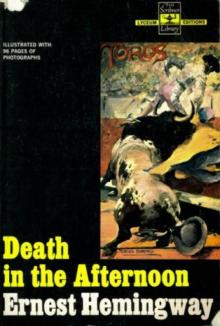 Death in the Afternoon
Death in the Afternoon In Our Time
In Our Time For Whom the Bell Tolls
For Whom the Bell Tolls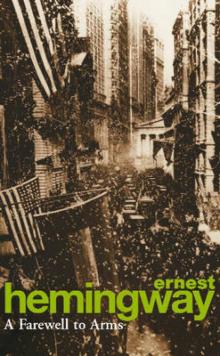 A Farewell to Arms
A Farewell to Arms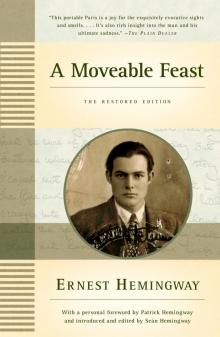 A Moveable Feast
A Moveable Feast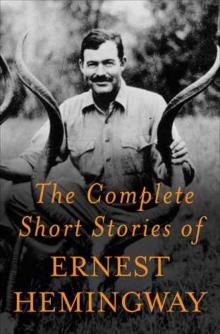 The Complete Short Stories of Ernest Hemingway
The Complete Short Stories of Ernest Hemingway Big Two-Hearted River
Big Two-Hearted River Winner Take Nothing
Winner Take Nothing Islands in the Stream
Islands in the Stream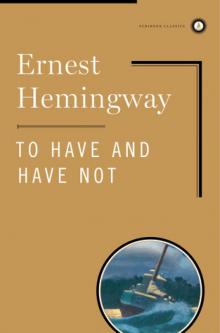 To Have and Have Not
To Have and Have Not The Snows of Kilimanjaro and Other Stories
The Snows of Kilimanjaro and Other Stories Across the River and Into the Trees
Across the River and Into the Trees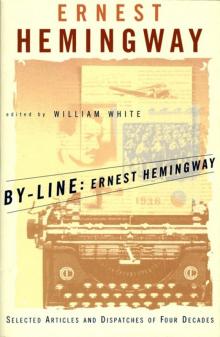 By-Line Ernest Hemingway
By-Line Ernest Hemingway True at First Light
True at First Light Men Without Women
Men Without Women The Nick Adams Stories
The Nick Adams Stories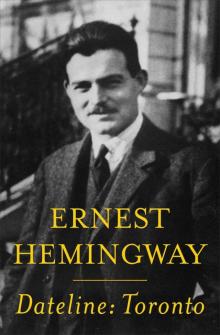 Dateline- Toronto
Dateline- Toronto The Torrents of Spring
The Torrents of Spring Short Stories
Short Stories